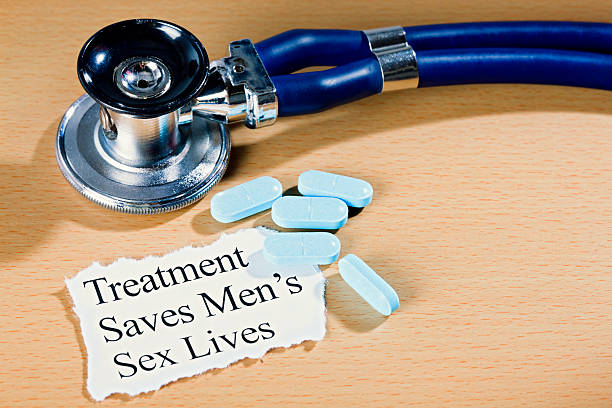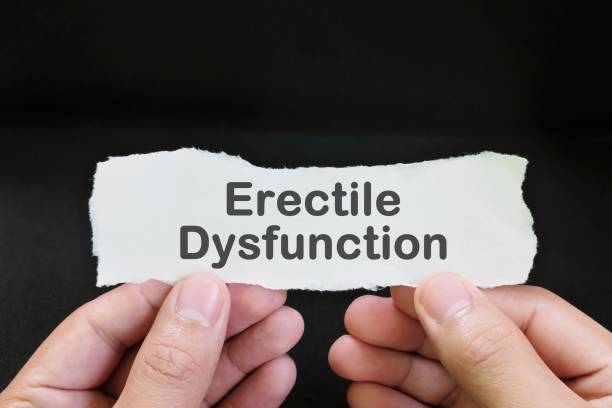Erectile dysfunction (ED) is more common than many men realize, and it can affect men of all ages—not just older adults. While it’s normal to have occasional trouble getting or keeping an erection due to stress, fatigue, or alcohol, frequent or ongoing problems may point to a more serious health concern. Ignoring these signs can impact not only your sex life but also your confidence and your overall health.
That’s why knowing when to see a doctor for erectile dysfunction is so important. A medical professional can help find the cause, rule out hidden health issues, and recommend treatment that works for your needs. Getting help early can also prevent ED from getting worse over time.
In this guide, we’ll cover the common warning signs of ED, what to expect during a doctor’s visit, the different treatment options available, and why erectile dysfunction may be linked to other health problems like diabetes or heart disease.
What Is Erectile Dysfunction?
Erectile dysfunction happens when you have trouble getting or keeping an erection firm enough for sex. This can make intimacy stressful and affect both you and your partner. It’s important to note that ED is not the same as low sex drive, although the two can sometimes occur together. Low sex drive is linked to desire, while ED is more about blood flow, nerve signals, and physical response.
ED can occur at any age, even in younger men, but it becomes more common as men grow older. Factors like stress, lifestyle habits, medical conditions, or certain medications can increase the chances of experiencing it. According to the National Institute of Diabetes and Digestive and Kidney Diseases, about 30 million men in the U.S. are affected by erectile dysfunction. This shows that ED is not rare—and seeking help is a smart step toward better health and confidence.

Occasional vs. Chronic ED: What’s Normal?
It’s normal for men to sometimes experience difficulty with erections, especially during periods of stress or exhaustion. Everyday factors like lack of sleep, too much alcohol, or even temporary performance anxiety can all interfere with sexual function. In these cases, the issue usually goes away on its own once the underlying cause is resolved.
However, if erection problems happen more than half the time, or if they continue for several weeks or longer, it may point to a more serious health concern. Ongoing ED can be linked to conditions such as diabetes, high blood pressure, or heart disease. It can also take a toll on your confidence and relationships if left untreated. Recognizing the difference between occasional issues and chronic erectile dysfunction is important for knowing when to see a doctor and get the right help.
Occasional ED May Be Caused By:
- Stress at work or in relationships
- Drinking too much alcohol
- Lack of sleep
- Temporary anxiety about sexual performance
Chronic ED May Be Caused By:
- Diabetes
- High blood pressure
- Heart disease
- Low testosterone
- Nerve damage
- Side effects from medications
If ED is becoming frequent, don’t ignore it. Your body may be telling you something important.
When to See a Doctor for Erectile Dysfunction
You should see a doctor if you notice any of the following warning signs of erectile dysfunction:
- ED happening more than half the time you attempt sexual activity, which may signal an underlying medical issue.
- Sudden onset of ED without any clear reason, especially if it develops quickly and unexpectedly.
- ED combined with other symptoms like chest pain, shortness of breath, dizziness, or numbness, which could point to a cardiovascular problem.
- Difficulty maintaining erections even when aroused, making sexual activity stressful or unsatisfying.
- Changes in sexual desire or lower energy levels, which may suggest low testosterone or other hormonal imbalances.
- ED after starting a new medication, since some prescription drugs list erectile dysfunction as a possible side effect.
If ED is ongoing, it’s not just about your sex life or confidence. Persistent erectile dysfunction can be a sign of more serious health conditions such as heart disease, diabetes, high blood pressure, or hormonal problems. Recognizing these symptoms early and seeking medical advice can help prevent complications and improve both your sexual health and overall well-being.
Tip: If you experience sudden ED along with chest pain, dizziness, or weakness, seek medical care right away. These could be signs of a heart attack or stroke.
Why Erectile Dysfunction Can Signal Other Health Problems
Erectile dysfunction is often one of the first warning signs of cardiovascular disease. Because the blood vessels in the penis are smaller than those in the heart, they tend to show problems earlier. Issues such as plaque buildup or poor circulation may appear first as ED before showing up as chest pain or other heart-related symptoms. This makes erectile dysfunction an important early signal that should not be ignored.
ED may also point to other serious health concerns, including:
- Diabetes: High blood sugar over time can damage nerves and blood vessels, both of which are essential for normal erections.
- High blood pressure: Constant strain on the blood vessels can reduce blood flow, making it harder to achieve or maintain erections.
- Hormonal issues: Low testosterone or other hormone imbalances can directly affect sexual performance and energy levels.
- Depression or anxiety: Mental health conditions can lower desire and increase stress, both of which play a big role in sexual health.
According to the American Heart Association, men with erectile dysfunction are more likely to develop heart disease within five years compared to men without ED. This shows that seeing a doctor for erectile dysfunction is not just about improving your sex life—it’s about protecting your long-term health and catching serious conditions before they become life-threatening.seeing a doctor isn’t just about sex—it’s about protecting your overall health.
What to Expect at the Doctor’s Office
Talking about ED may feel uncomfortable, but doctors are trained to handle it with sensitivity. Here’s what usually happens:
Medical History
Your doctor will ask about:
- How often you experience ED
- Any other health conditions you have
- Medications you’re taking
- Lifestyle habits (smoking, alcohol, exercise)
Physical Exam
This may include checking:
- Blood pressure and heart health
- Genital exam
- Signs of hormonal imbalance
Lab Tests
Blood or urine tests may be ordered to check for:
- Diabetes
- Low testosterone
- Cholesterol problems
Possible Referrals
You may be referred to a:
- Urologist (specialist in male reproductive health)
- Endocrinologist (hormone specialist)
- Cardiologist (heart health specialist)

Treatment Options for Erectile Dysfunction
The good news is that ED is treatable at any age. Treatment depends on the cause but may include:
Lifestyle Changes
- Quit smoking
- Exercise regularly
- Manage stress
- Improve diet
- Limit alcohol
Medications
Prescription medications like sildenafil (Viagra) or tadalafil (Cialis) can improve blood flow to the penis. Always take these under medical supervision.
Hormone Therapy
If low testosterone is the cause, hormone replacement therapy may help.
Devices and Procedures
- Vacuum erection devices
- Penile implants
- Injections or suppositories
Counseling
If stress, anxiety, or relationship problems are causing ED, therapy or counseling can be very effective.
How to Talk to Your Doctor About ED
Bringing up ED with your doctor can feel awkward at first, but remember—erectile dysfunction is a common medical condition that millions of men experience. Doctors talk about ED often, so there’s no need to feel embarrassed. The more open you are, the faster you can find solutions that improve both your sexual health and overall well-being.
Here are some helpful tips for talking to your doctor about ED:
- Be honest: Share when the problem started, how often it happens, and whether it has been getting worse. The details give your doctor important clues about the possible cause.
- Discuss your lifestyle: Mention habits like smoking, alcohol use, lack of sleep, or stress at work. These can all play a role in erectile dysfunction.
- Bring a list of medications: Some prescription drugs, such as those for high blood pressure or depression, can have ED as a side effect. Sharing this list helps your doctor see the full picture.
- Ask questions: Don’t hesitate to ask about treatment options, from lifestyle changes to medications or therapies. Understanding your choices helps you feel more confident in managing ED.
The more honest and detailed you are, the better your doctor can help identify the cause and recommend the right treatment. Taking that first step may feel uncomfortable, but it’s one of the most important moves you can make for your health.

Can You Prevent Erectile Dysfunction?
While not all cases of erectile dysfunction can be prevented, there are many steps you can take to lower your risk and support better sexual health. Simple lifestyle changes can make a big difference in how your body responds and how well blood flows throughout your system.
You can lower your risk of ED by:
- Staying active with regular exercise: Physical activity improves circulation, strengthens the heart, and helps maintain a healthy weight—all of which are important for strong erections.
- Eating a heart-healthy diet: Foods rich in fruits, vegetables, lean proteins, and whole grains keep your blood vessels clear and support overall energy.
- Keeping blood sugar under control: For men with diabetes, managing blood sugar is key to preventing nerve and blood vessel damage that leads to ED.
- Reducing stress: High stress and anxiety can interfere with sexual performance. Relaxation techniques, deep breathing, or hobbies can help lower stress levels.
- Limiting alcohol: Too much alcohol can weaken erections and lower testosterone levels. Moderation is key.
- Avoiding smoking: Smoking damages blood vessels and reduces circulation, which directly impacts erectile function.
These healthy changes not only improve sexual health but also protect your heart, reduce the risk of chronic disease, and boost overall well-being. By focusing on prevention, you’re taking steps toward better confidence, energy, and long-term health.
When to See a Doctor for ED: Quick Checklist
You should book an appointment if:
- ED happens regularly, not just occasionally
- You notice sudden changes in erections
- You have ED plus other health symptoms
- Your confidence or relationship is suffering because of ED
Conclusion: Don’t Wait to Get Help
Erectile dysfunction is nothing to be ashamed of—it’s a common medical condition that millions of men face at some point in their lives. Struggling with ED does not mean you are less healthy or less masculine. Instead, it’s your body’s way of signaling that something may need attention. In many cases, ED can be an early warning sign of underlying health problems such as heart disease, diabetes, high blood pressure, or hormonal imbalances.
If ED is frequent, ongoing, or starting to affect your confidence and relationships, it’s time to talk to a doctor. Seeking medical advice is not just about improving your sex life—it’s about protecting your overall health. The right treatment can help restore strong erections, boost energy, and rebuild self-esteem. More importantly, addressing ED early may prevent other serious health complications down the road. With the right care, you can regain control of your sexual health and improve your overall quality of life.
👉 Take action today: Don’t ignore the signs. Schedule a check-up and get the support you need.
Have you or someone you know struggled with ED? What questions do you still have about talking to a doctor? Share your thoughts in the comments below—we’d love to hear from you.

